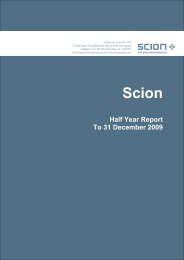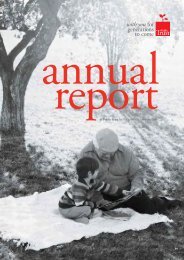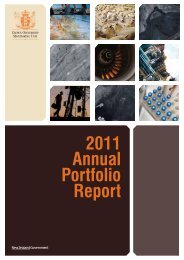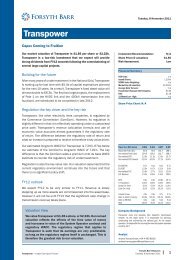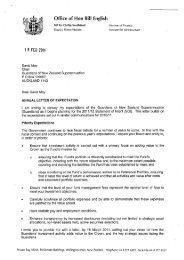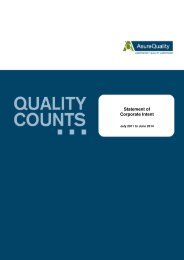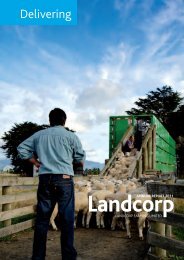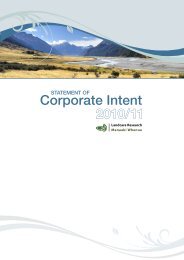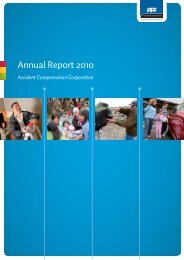Landcorp - Crown Ownership Monitoring Unit
Landcorp - Crown Ownership Monitoring Unit
Landcorp - Crown Ownership Monitoring Unit
- No tags were found...
You also want an ePaper? Increase the reach of your titles
YUMPU automatically turns print PDFs into web optimized ePapers that Google loves.
Note 4 – Significant Accounting Judgements, Estimates and Assumptions (continued)Classification of investments and derivatives<strong>Landcorp</strong> is required to classify its shareholding portfolio as available-for-sale and value it at fair value. The share portfolio largely comprises sharesand investments in agricultural cooperative and processing companies, which <strong>Landcorp</strong> is required to hold to facilitate farming operations. As such,<strong>Landcorp</strong> is normally unable to sell these investments without disrupting <strong>Landcorp</strong>’s farming operations. Detail on the valuation of <strong>Landcorp</strong>’sshareholding portfolio is shown in Note 26.<strong>Landcorp</strong> does not apply hedge accounting as the benefits of applying hedge accounting are not perceived to exceed the compliance costsinvolved. This means that all derivative financial instruments must be classified as held-for-trading. Derivative financial instruments are used by<strong>Landcorp</strong> to hedge interest rate, exchange rate and commodity price risks. <strong>Landcorp</strong>’s policies explicitly prohibit trading in financial instruments.Detail on the valuation of <strong>Landcorp</strong>’s derivative portfolio is shown in Note 26.TaxationCurrent taxation expense is based on the potential taxation expense that would be filed with the taxation authority given management’s intentat balance date. Under taxation legislation, <strong>Landcorp</strong> has discretion in the valuation methodology used for livestock, and in the timing of claimingexpenses relating to fertiliser, amongst others. The actual taxation expense may differ from that shown in the financial statements if managementsubsequently changes any of these elections.Deferred tax balances result from taxable differences between balance sheet values and taxation values for assets and liabilities. Management’sintention to use or sell, will determine whether a difference is taxable, this is based on management intention at balance date.Deferred tax balances relating to revalued land and livestock are required to be based on the tax effect if all land and livestock were to be sold atbalance date. Management has no intention of selling either affected land or the entire livestock herd and this deferred tax liability is unlikely tobe incurred in <strong>Landcorp</strong>’s ordinary course of business.(ii) Significant accounting estimates and assumptionsValuation of investments and derivatives<strong>Landcorp</strong>’s share portfolio comprises investments in cooperative companies. These companies commonly have restrictions on share ownership andlimited transferability of shares. Many of these shares may only be sold back to the cooperative company at the cooperative’s deemed share price.The fair value of shares in cooperative companies is based on the lower of the current cost to purchase additional shares or required sale values.The fair value of listed shares and other investments are based on reported market values at balance date.Derivative financial instruments are valued based on estimated market values at balance date, given prevailing market interest rates and the termsof the derivative instruments.Freehold land and buildingsThe valuation of freehold land and buildings is based on observed market prices for properties of similar location, land use and size. No discountor premium has been made for the scale of <strong>Landcorp</strong>’s land holdings. Factors affecting the valuation of <strong>Landcorp</strong>’s freehold land and buildings aredetailed in Note 28.The valuation of land and buildings takes into account the observed price effects of various legal obligations placed on <strong>Landcorp</strong>’s land ownership.In the North Island deductions of 0–6% have been made for obligations arising from section 27B of the State Owned Enterprises Act. The SouthIsland properties include a deduction of up to 5% to reflect the effect of the Right of First Refusal granted to Ngai Tahu under the Ngai TahuClaims Settlement Act.Following the Agreement Concerning <strong>Landcorp</strong> Land Protected from Sale, <strong>Landcorp</strong> considers that the threat of occupation of properties has beensignificantly reduced. No deduction from observed market prices has been made for this threat.61



